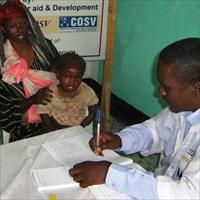GHANA: Meningitis outbreak kills 10

Ten people have been confirmed dead and two are hospitalised following an outbreak of meningitis in north-central Ghana.
The disease broke out on 25 October in Yaw Bronya farming community in the Ashanti Region, 250km north of the capital Accra.
Local authorities have closed down schools and banned all public gatherings. “We are treating this as an epidemic,” the head of the Ashanti regional health directorate, Mohammed Bin Ibrahim, told IRIN.
The meningitis-related deaths have occurred in the past two weeks, according to Ibrahim.
Health workers from Accra have travelled to Yaw Bronya and are on standby to attend to new cases.
“We are tackling this on four fronts," Ibrahim told IRIN. "We are embarking on intensive education, early diagnosis and treatment of early cases as well as prompt vaccination.”
Meningitis is a highly infectious bacterial disease that particularly targets children and young adults. It is characterised by inflammation of the brain lining and spinal cord, causing headaches, vomiting, convulsions and a stiff neck. If not treated it is fatal. The bacteria are transmitted from person to person through droplets of respiratory or throat secretions.
According to the World Health Organization (WHO), 5.5 million Ghanaians or over a quarter of the population are at risk of contracting meningitis. A meningitis outbreak killed 281 people and infected 1,659 in northern Ghana in November 1997, according to WHO.
 Back and Next - Back and Next
Back and Next - Back and Next See Also - See Also
See Also - See Also